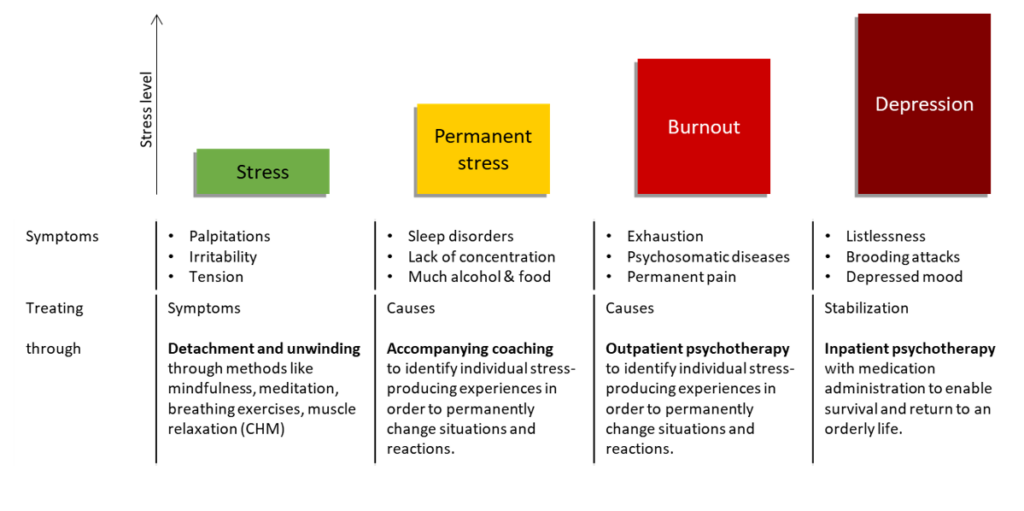About Chronic Stress
Typical questions about stress
Stress is on everyone’s lips, but many people don’t know exactly what it’s for, how it arises, and how to manage it. This FAQ is intended to provide clarity.
01.
What is stress?
„Stress is a persistent unpleasant state of tension that leads to impairments in psychological well-being and health.“
Prof. Siegfried Greif, Uni Osnabrück
02.
How does stress develop?
Stress occurs when a situation is perceived as threatening and the body prepares to fight or flight to defend against this threat by releasing adrenaline and cortisol, thereby warming up the muscles (sweating), increasing the heart rate (restlessness), drawing blood from the skin (cold feet and hands), standing up the hair to look bigger (goose bumps), and shifting oxygen from the brain to the muscles (lack of concentration).
All of this happens automatically and unconsciously in milliseconds and was set up by nature thousands of years ago to ensure the survival of the human species.
03.
How does one cope with stress?
Stress is over when the elevated levels of adrenaline and cortisol are relieved through physical activity such as ‚classic‘ fight and flight and nowadays sports.
Stress can also be reduced by distancing and unwinding, such as leaving the room, taking time off for commuting, drinking (too much) alcohol, or eating (too much) sweets, although not all activities are equally healthy.
Other types of distancing and un-winding can be found in many workplace health management CHM programs on topics such as meditation, mindfulness, breathing exercises, body scans, muscle relaxation and much more.
05.
When does stress become a problem?
Stress becomes a problem when the levels of adrenaline and cortisol always remain at the high fight-or-flight level. Then the body switches to the emergency mode of permanent stress.
In this emergency mode, the body shuts down everything that is not necessary for survival. Therefore the cognitive abilities decrease substantially and one makes e.g. worse decisions, more mistakes and is more irritable. One’s own performance declines, so that permanent stress is a major performance problem even before burnout.
06.
How do CHM measures help?
Corporate health management measures often focus on dealing with short-term stress. Here, mindfulness, breathing techniques and meditation can show good results.
If someone feels permanently stressed, these programs often can’t do anything or even create more stress because they require the person concerned to spend time and be relaxed, which they are no longer capable of doing.
07.
Why are permanently stressed people helpless?
In addition to their limited cognitive abilities, people under constant stress are unable to perceive themselves, their situation, and their needs and feelings due to the elevated levels of adrenaline and cortisol, and are unable to develop ways out of their situation. They are stuck in permanent stress or moving towards burnout.
The way out is for relatives, friends, superiors, personnel managers or colleagues to reach out to them and mirror to them that they have a problem and that they need professional help, e.g. from a coach, before the permanent stress turns into burnout.


